Last updated on 01/13/2020
Recap: With the latest data showing average US wages increasing at 3% a year, and Oregon having moved into the top half of the US income distribution by state, the union’s proposal for 3% COLA/ATB raises is a baseline. The proposed 5% for Excellence raises, and 2% for internal equity over the 3-year contract fit with the administration’s stated priorities. Cecil calls this the 3-9-4 plan.
The administration’s lead negotiator Missy Matella was receptive to the union’s proposal to tax the athletic department and use the money for student scholarships, seemingly agreeing that the university could not continue allowing AD Mullens to use the Duck money bucket as his safe space.
The union’s new TRP buyout plan also got a warm reception from the admin side. On the other hand, they seemed a bit skeptical of the proposal to tie faculty salary floors to a percentage of top admin salaries (15% or so).
See below for the parking and childcare proposals.
Expect lots of questions from the administration at the next round, same time and place next Thursday.
12PM, EMU Crater Lake Room. Usual disclaimer: My opinion and interpretation of what the bargainers are saying, thinking, or should be saying or thinking. Nothing is a quote unless in quotes. In the interests of transparency the union has posted the articles they will be presenting to the administration here: http://uauoregon.org/bargaining1920/ and more info is here. UAUO is also live-blogging here (Go down to the live blogging post, it’s in the comments.)
About 80 faculty and others present.
Deb Green starts with fringe benefits: http://uauoregon.org/wp-content/uploads/2020/01/ARTICLE-28.pdf
The big change is childcare:
Matella: Thanks, we’re aware of this longstanding problem and will examine this proposal.
12:20: Cecil presents parental leave article. This is an effort to boost Oregon’s birth rate thereby increasing future UO enrollment and ensuring the long-run sustainability of PERS.
http://uauoregon.org/wp-content/uploads/2020/01/Parental-Leave.pdf
Cecil: The gist is 12 weeks leave for birth or adoption plus up to another 12 weeks sick leave/vacation, including borrowing sick leave from the future. Additionally, no *extra* teaching responsibilities for the third term back.
Matella: Asks a variety of clarifying questions.
PARKING: http://uauoregon.org/wp-content/uploads/2020/01/PARKING.pdf
Deb Green presents this radical proposal to extend a few of the parking privileges that the athletic department nomenklatura get to the faculty:
Parking has gotten worse since the athletic department seized the East 15th parking to build its “Triumphal Way” for the 2021 IAAF championships.
PROFESSIONAL DEVELOPMENT: http://uauoregon.org/wp-content/uploads/2020/01/ARTICLE-35.pdf
Boscha presents. Cleans up ASA funding rules, sets them at $1500 min. Makes clear that Career faculty etc. get ASA support funds.
HEALTH BENEFITS: http://uauoregon.org/wp-content/uploads/2020/01/Article-27.pdf
TRAININGS: http://uauoregon.org/wp-content/uploads/2020/01/TRAININGS.pdf
Requires the administration to offer training to the faculty on discrimination law, and to department heads on the CBA etc.
1:06 Break til 1:20.
1:30: Admin team comes back late. Cecil gives them a stern dressing down.
Matella: We’ll have more substantive questions next week. Cecil: OK
TRP: http://uauoregon.org/wp-content/uploads/2020/01/Tenure-Relinquishment-Program.pdf
Cecil: We’re proposing a phased in new TRP, whilst grandfathering in the old plan. “We hear from the administration that you would like to pay some faculty a lump sum of money to have them go away.” Matella: No comment.
Cecil: New “Tenure Relinquishment Plan”: Would allow a gradual step down in teaching, with details negotiated between faculty and department in advance. 1.0 FTE year 1, 0.8 FTE year 2, etc:
The buyout provision would allow faculty to exit early, in exchange for the salary they would have been paid in the following year.
This buyout proposal would save the university a significant amount of salary (by allowing the administration to replace them with cheaper, shinier new assistant profs) and also PERS.
Matella: How would this impact PERS payments to faculty? Pratt: Good question. Productive back and forth on details. What happens if faculty take the buyout, go off to some other university, double dip? Interestingly, our administrators don’t even need to leave to do this, e.g. VP Brad Shelton:
STUDENT SUPPORT: http://uauoregon.org/wp-content/uploads/2020/01/Student-Support.pdf
Totally innocuous, nothing to see here. Snoozer. Oh, wait, Urbancic presents:
Section 1. At the end of each fiscal year, the University will calculate the total amount donated to the Duck Athletic Fund in that year. The University will direct 23 20% of the donations to the Duck Athletic Fund (or its successor) to faculty who were evaluated to have met or exceeded expectations on their most recent performance review. The funds will be distributed on a proportional basis as an annual performance bonus to the faculty who have met or exceeded expectations.
Section 2. Seventy-five percent of the annual performance bonuses provided to faculty who have met or exceeded expectations will automatically be donated to a scholarship fund to offset the cost of on-campus living for first-year PathwayOregon scholarship recipients who live on campus. The remaining twenty-five percent will be paid to faculty as a one-time bonus on September 1.
Urbancic points out that the bloated Duck Athletic Department is the elephant in the room, vacuuming up all the peanuts, and that this proposal would give them a chance to contribute something positive back to the university. This would give the academic side a stake in the success and growth of the Ducks, in contrast to the current dysfunctional situation.
Civil and Respectful finger-snaps from the audience.
Matella: Appreciate the article and the explanation. Our side will come back with a response. Cecil: You understand that performance bonuses are a mandatory subject for bargaining? Matella: Some of it. I am interested in trying to change the relationship between athletics and academics. Positive response to a positive proposal. “The concepts are interesting.”
Matella then goes on to say that DAF donations may be restricted. Cecil: Do they have to be? [No. Or they could use media revenues.]
Cecil pushes back. The union is not going to sit here and listen to you tell us the bucket is dry, and refuse to work out a way to fill it back up.
Matella starts digging a hole on this, making claims about restricted funds and how no other universities do this. Big mistake. She hasn’t done her homework on these issues.
MOVING ON TO SALARIES: http://uauoregon.org/wp-content/uploads/2020/01/ARTICLE-26.pdf
Cecil: It’s your standard 3-9-4 plan. 3% ATB every year. Add 5% merit in year 2, and 1% equity in years 2 and 3. Add it up. 3-9-4.
Cecil: Three year contract. Go back to making raises start on July 1 (or Sept for 9 month) instead of January. The change to January was made 5 years ago, and causes lots of problems since it doesn’t sync with reviews.
Equity raises: Each department must develop an internal equity policy to deal with inversion compression, etc. Matella: What does equity mean? Cecil: We can work that out, or let the unit faculty decide what their issues are and how to address them. Matella: Loves unit autonomy, but wants central control. Even she laughs at that contradiction.
Merit: Sinclair: When we do merit we want it to be a big enough pool to make it worth people’s time to do a thorough job evaluating. That’s why we proposed 5%, all in one of the 3 years.
Floors, etc: Cecil: Make floor increase with years at UO, etc.
OR, adopt floor proposal II:
Cecil: Improve UO’s sense of community and eliminate complaints about administrative bloat, by tying minimum faculty salaries to a modest percentage of the average senior administrator salary. e.g.:
Matella: Hmm, this might upset some of my better paid bosses, by making it more expensive for them to give themselves more raises.
Cecil: Hmm.
Matella: These are all the proposals that you believe will have an economic impact? Cecil: Mostly. Matella: It may be a month before we cost these out. Two weeks until the administration will get its act together with their proposals.
UOM: I skipped a few things, but that’s the gist. See you next week. Expect questions from the admins on these proposals, and more faculty union proposals.
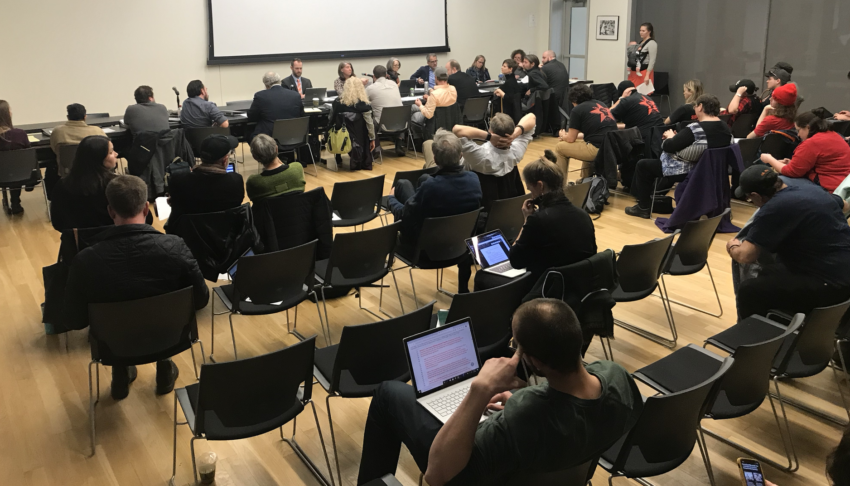
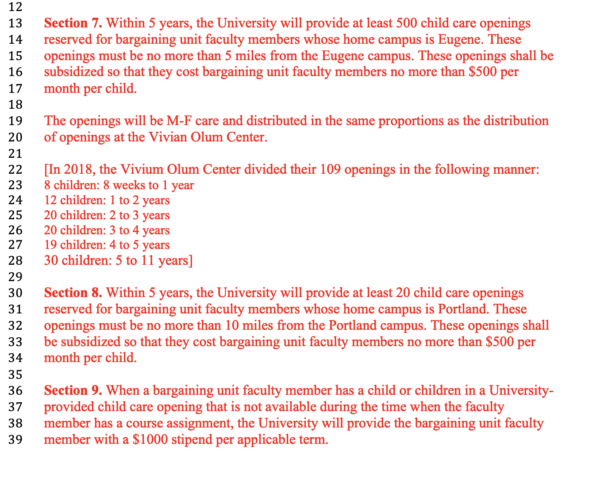
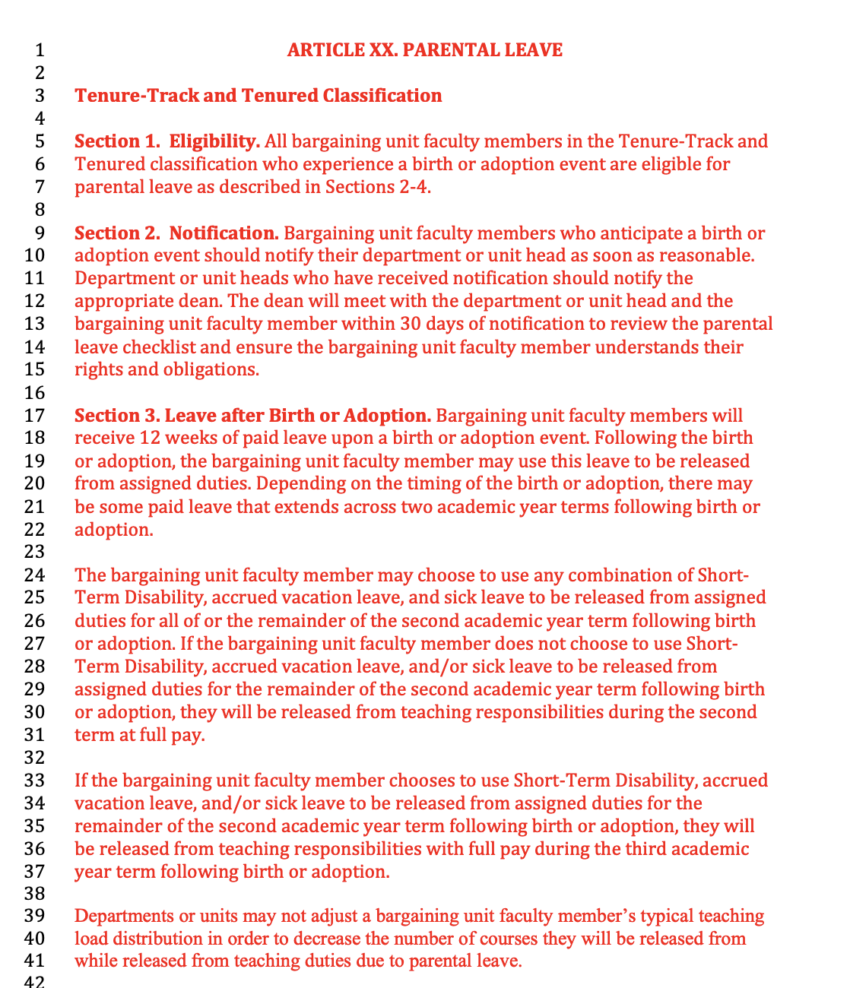
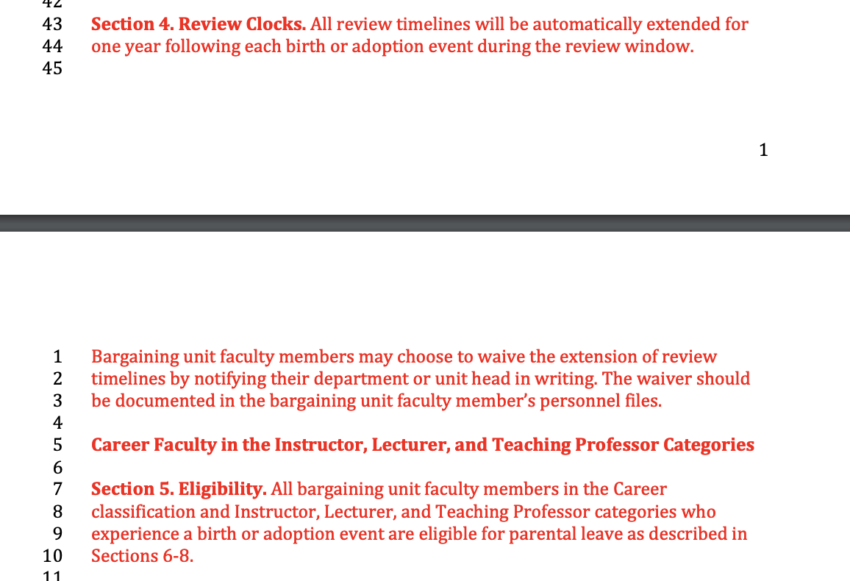
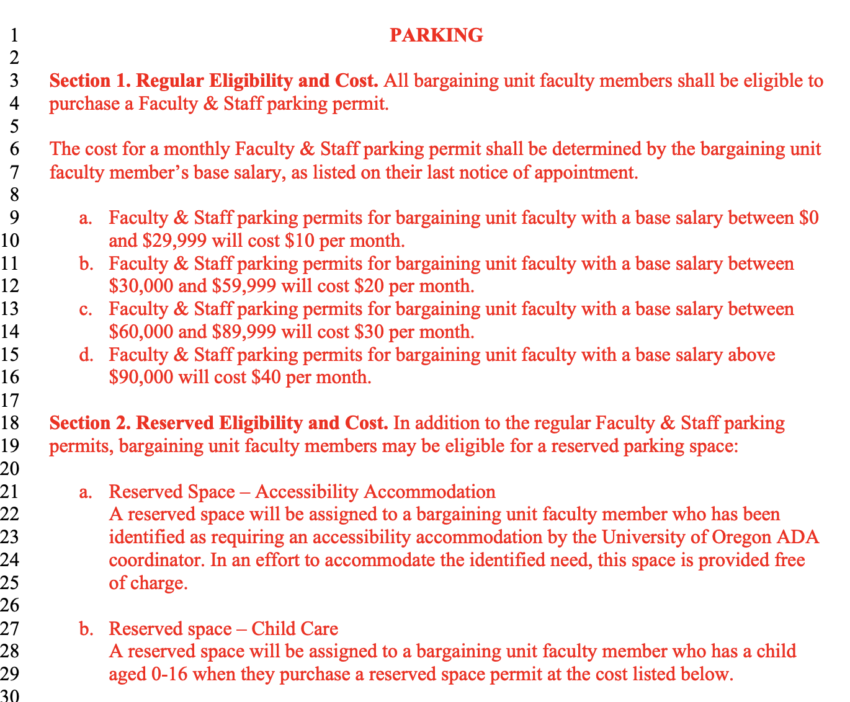
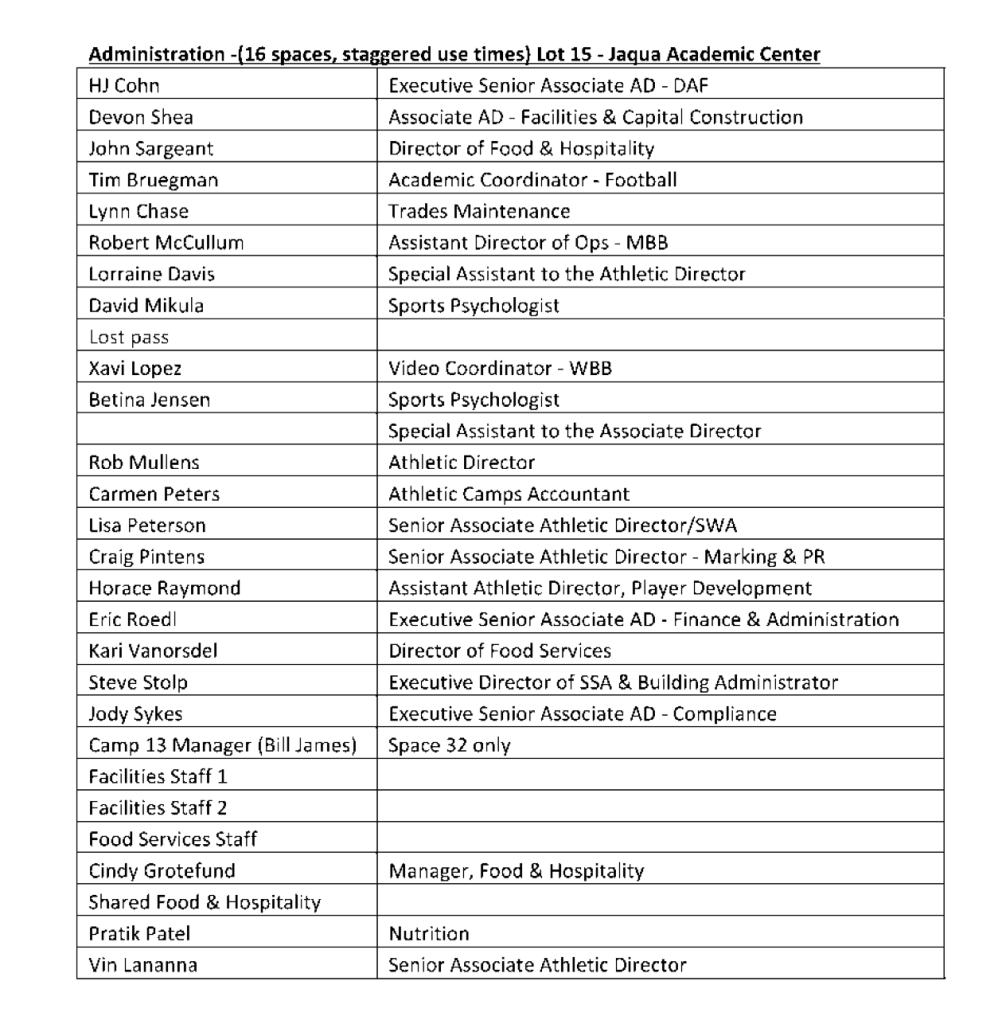
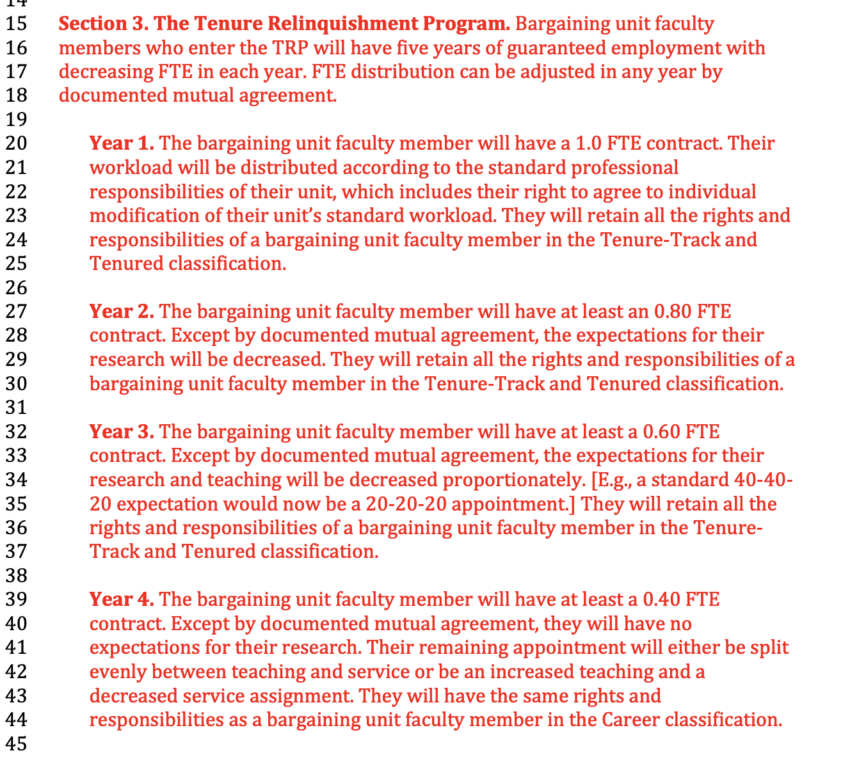
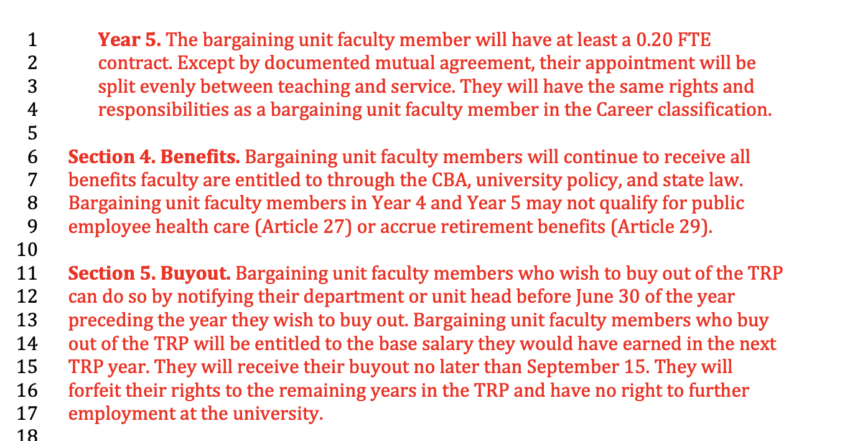

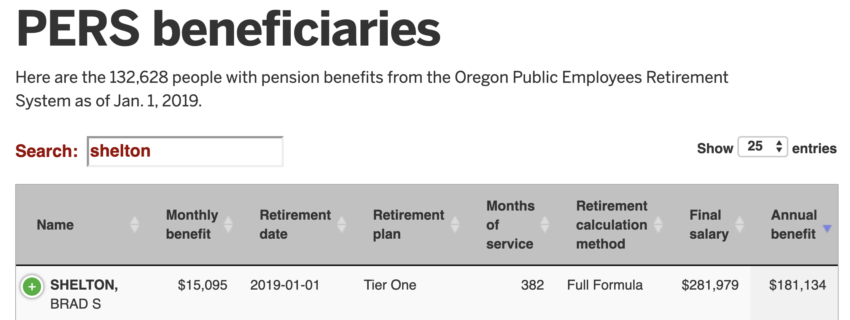
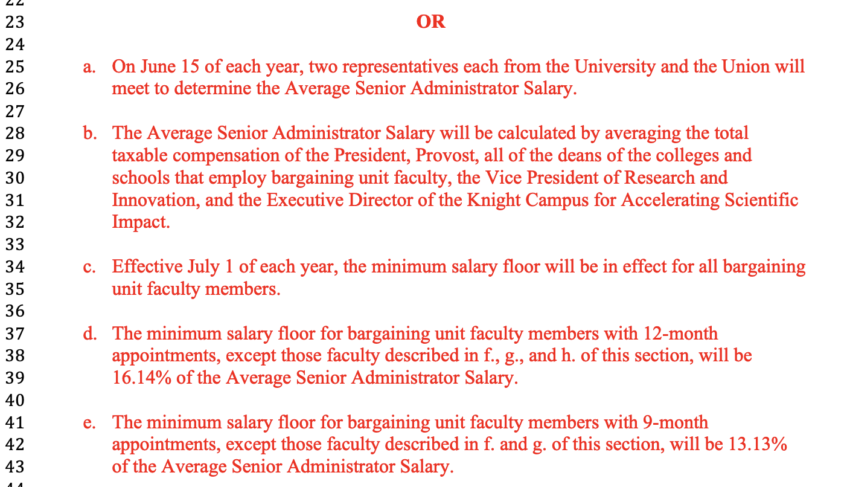
There are technical solutions to the childcare problem. Historically, there was only netflix. Now with Disney+ children from 2-10 can be left alone with Disney to care for them for at least 8 hours with no need of food and water (based on in-depth qualitative research conducted at my home in a controlled environment during the final two weeks of December). This will free up child care workers for children younger than 2, driven prices down to the affordable region.
The admin should counter offer with free Disney+ accounts for all faculty.
What does this mean in departments where the teaching load is 2-2-0. Do they get two more courses off? Or in the case of departments where the load is 2-2-1, is 12 weeks off 2-2-0, or 2-1-0.
12 weeks off is a bit vague.
Easiest solution to parking problem.
Zone it. Reserved spots are inefficient when left empty. Economists have pointed this out to parking staff and had them ignore this. Most other campuses have zoned parking. It works.
Also, construction workers should be able to park in Johnson hall parking only, rather than general parking, as Johnson hall is responsible for most of the construction around campus.
Another way to reduce congestion in parking is to reduce demand. We should be incentivizing public transit, biking, and walking!
What do you mean by “zone it?” Isn’t it already zoned as either faculty/staff or students, etc.? And can you tell me some of the other campuses that have zoned parking like you are referring to that work? I am very interested in this issue, and realize I should use alternate transportation, but am unwilling to because the cost to my time is too much.
You buy zone 1 you’re a bit closer to campus. By zone 2, you’re a bit further away. Etc etc.
Each zone is cheaper, but a bit further away is normally how zoned parking works. Zone 1 can park in zone 1-5, zone 2 in 2-5, zone 5 in just zone 5. etc.
Huh, that kind of zoning system does seem like it would solve the parking issues for employees who make quite a lot of money, but would exacerbate the problem for many? But maybe it’s not really how I’m imagining it having not seen pricing and how it works irl.
Oregon State University has zoning. AND they have a free shuttle around campus to get you where you need to go. We don’t have to reinvent the wheel.
And two ships, the Oceanus and the Elakha: https://ceoas.oregonstate.edu/ships/
I wish that the bargaining units on campus would come together with comprehensive solutions and requests that are equitable for all. It is grating to see faculty asking for FAR more in terms of paid time off and childcare subsidies than were negotiated by the lower paid employees who do not have flexibility in their work schedules (SEIU and GTFF).
I bet most faculty probably don’t support these proposals. Seems like the UA is gearing up for the next presidential debate in my view than in making us a real top tier research university.
Maybe you’re unfamiliar with the beliefs of the median university faculty member?
Do you think they support the new TRP?
I don’t understand the new or old one. I’m still confused. I currently expect to die before I think about retirement so I only care about survivor benefits.
not all faculty…please note that some NTTF are no where close to the kind of compensation their tenured peers receive, and are working multiple jobs or picking up gigs at multiple institutions, which means “flexibility” rarely exists…
You said this much more graciously than I’m going to, inquiring. “Grating” is putting it mildly. What happens to the staff, OAs, and community members (and yes, I’m aware, some faculty) who can hardly afford their own daycare spots when they get pushed out to make room for the 500 $500/month spots?
I believe that we ALL deserve affordable childcare, but to see it potentially going first to a group that includes those who make in excess of $85K/9 months and for whom coming in at 8:00 am isn’t a requirement, it’s an occasional imposition… is not just grating, it’d be infuriating.
This athletic bonus idea is great, but DOA.
Are these bonuses taxable?
If so does, my bonus of 1,000 create 250 of taxes, that the 250 I get to keep barely pay the taxes? Or if it creates 350 in taxes, does this mean getting the bonus really hurt my taxable income?
buckets. always buckets.
Thar’s a hole in the bucket, dear Liza…
Salary Proposals
Good things
1. July Reviews
2. Amount of merit raises (if it happened but it won’t)
3. Amount of COLA’s (if it happened but it won’t)
Bad Things
Equity Raises
1. So we want to tax merit? Because equity is such a vague concept, this is actually a place where departments, or the powers that be in them, can rent seek. This is fine when departments are well run. But well run departments don’t have the discrimination problems Cecil brings up. And equity with small samples is often just a tax on merit. Also it fails to address that external equity problems for some departments are MUCH larger than for others.
2. Why does the union keep calling some faculty members career faculty? Don’t we all have careers.
3. 1 round of merit raises is a bad cycle unless the precedent is there are merit reviews every other year.
Given the administration paid usually less than half of our initial proposals, this means annual raises less than 2 percent, which won’t keep up with inflation.
Sadly, the last big raises paid out happened under Gottfredsen and that will happen this cycle too. Unless Schill really wants to make us a world class university which requires world class salaries. The board saw that need when recruiting a president. When will a president come forward and say increasing salaries is priority #1. The endowed chairs is great, but nobody wants to go be an endowed chair at a department where everybody feels underpaid and under valued.
“Career” is part of the University’s classification system. It refers to Non Tenure-track faculty that have on-going appointments (not Pro-temp, Visiting or so on.)
Does the university call them career faculty? Or career NTTF?
I had never heard somebody say the term “career faculty” before
“Career NTTF” is the exact wording my offer letter had.
The notion that equity pay is useless and will only benefit the meritless is BS. Even well run Departments have equity issues (e.g., inversion between ranks) involving well performing faculty.
There are equity issues among meritorious faculty caused by retention, compression and other factors even in well run, well performing Departments. There needs to be a reasonable mechanism to continuously deal with these issues.
Thanks for comments, please adopt a screen name.
If achieved, will that child care subsidy be extended to faculty with children at Olum or elsewhere?
I believe that is the goal.
So more childcare spots at a discounted rate? Where does the rest of the $$ come from to pay your SEIU sisters and brothers who will be performing the work at this discounted rate?
Pat Kilkenny’s Duck baseball program sells about $230K in tickets, and costs about $2,730K. Dump it and we save $2.5M recurring. Say UO’s faculty, staff, OAs, and GE’s have 500 kids in daycare. (a total guess) That’s enough for a $5,000 per-year per-child daycare subsidy right there. If we need more, cut golf and tennis.
Data here: https://goducks.com/documents/2019/12/4//FY20_budget_for_website.pdf
I hear what you are saying although you’ll have a tough battle re-directing that funding if you cut a sport or two. You might have to keep some of those sports contractually just to stay in the Pac 12. I’m not disagreeing with you that the sporting enterprise is not feeding the academic enterprise (primary mission) but it is just not that simple.
I feel the frustration in the proposals and hear what you are saying, I just think if this is the sword you die on you’ll probably end up falling on it. You’ve fired at the most distant stars you could find and you just may hit the moon.
These proposals look like a lot message bills we see in congress. We don’t really expect this to pass but we’re telling you we are pissed off about things. The issue with that your relationship with admin has been so bad that they may see this as an attack and just trench right in. I hope I am wrong but it may make actual bargaining pretty tough. “Good faith” does not mean “We get whatever we want.” It means we try to meet each interests and understand and work together. This opening is likely not to lead to that.
Parking sucks on every campus everywhere. Nobody likes it. Zoned is the way to go. Those parking fees pay for maintenance and staff (more union sisters and brothers). Childcare is hard everywhere too. Lots of people have kids. It’s expensive to take care of them. Athletics is a giant money pit and machine with people at the top making obscene amounts of cash. Few universities do it right these days. I applaud your push to make it feed academics. Just not sure this proposal gets you there. Hopefully it at least gets some people seeing a different way.
Baseball program isn’t going anywhere. come up with a better solution.
Why didn’t you just ask for their firstborn? Holy smokes what a start. This is going to get popcorn eating from the gallery good.
We’re all better off paying Brad $316,000 for half days than $281,00 for full days. Better still, pay him $632,000 to go back to being an associate math prof.
Of all the things I want my dues going to, bargaining for parking is not on the list.
What is on your list?
Lobbying the state for more money. I want to increase the pot for everyone, not squabble among my colleagues about who deserves bigger raises, which museums should be gutted, or which expenses (parking, childcare, etc.) are more or less worthy of subsidy.
The State did give more money than expected last session, even though the focus was on K-12 not higher ed. Upper Admin has proven time and time again to be poor stewards of tax payer dollars.
A coordinated effort with the OSU and PSU union to get the state to support the universities with greater $$ would be pretty cool.
Or what if the union support the university in lobbying the state to sell bonds to match an endowment like the hat originally proposed?
Of all the the things I want my dues going to, bargaining for parking is near the top of the list.
Assuming sarcasm here…I’m with you….
Not sarcastic at all. Parking is a basic, quality-of-life issue that has been badly mishandled at UO. The endless and constant attempts by some to insist that we all walk/ bike/bus/carpool are silly and distracting, and then get used to justify the woeful conditions. This is plainly evident to anyone who’s ever visited campus from elsewhere.
Totally. The lack of helipads is also a quality-of-life issue that’s making my commute from Newport a real bummer.
According to this survey, slightly less than half of the faculty and staff drive to work, so your implication that non-drivers should be regarded as hippie outliers is silly.
https://cpfm.uoregon.edu/commute-survey
Why does a faculty member with a 16 year old kid need a reserved parking space?
Parking solution. Zone it out and everyone pays for reserved spaces. Only one who gets a reserved spot is President who generally comes and goes a lot.
Everyone else, VPs, Deans etc., or anyone else can have a reserved spot but have to pay for it. I’m a VP on my campus and if I want a reserved spot I would have to pay in excess of $1,000/year for it, on top of my parking pass I pay for as everyone does. Fair to me. If I want a reserved spot I pay a premium for it.
Yes, that would be a good solution. I’d rather see the union pushing for an extra $1000 to everyone rather than perks valued at that for a poorly justified subset. The child care negotiation leaves me with that feeling as well–say the union got the 500 slots, the end result would be a new VP administrator hired with a cumbersome administration team in a tangled bureaucracy managing “slots” all over town. Almost certain to not lead to a great outcome in addition to the other concerns voiced in the comments.
Basically childcare would become like many of the admin units on campus. Make sure you spend all of your money and ask for more to justify your continued existence.
Point taken. What administrative units can be pointed to on campus that do an efficient job?
Thanks to Concur travel reimbursements are now very efficient – so long as you pay out of pocket and don’t try to get reimbursed.
Can’t get to campus before 8:45 because of school drop off. After 16 kids can drive.
I guess it does come down to if we want to subsidize parking for a large set of people because a small fraction (many, I assume, with perfectly valid reasons) need to take their high schooler to school in a car.
Your kid can drive when 16 but can’t bike or ride the bus now? Mine do. And they’re definitely not driving to school when they’re 16!
I have a sick parent. Would I get subsidized parking?
I’m getting long-term medical treatment. Would I get subsidized parking?
How many reserved spaces would that be (anyone with a kid under 16) and would there be any left for the rest of us?
I get it that the old TRP is chock full of cronyism, racism, sexism and just good old corruption (all the ‘special assignments’ I’ve seen over the years make me want to puke). But, it baffles me why anyone on the faculty side thinks the new Tenure Relinquishment Plan is a good idea (except, possibly, for the Buy Out option). In Year 2, you teach your regular load for .8 salary plus the .06 increase to your base? And then in Year 3 you are teaching half your load for .66 salary? Maybe this is attractive to PERS people, but I don’t see it being remotely interesting to non-PERS folks. Who came up with this bulls**t?
I too am wondering about the TRP proposal. I don’t see how it would save the university money. The current system guarantees 5 years at .33 FTE. Unless my math is off, that means the university pays a faculty member 1.65 FTE over that period and in many cases gets a couple of classes a year taught for that money. Presumably, the other two-thirds of salary could go to hiring a new faculty member. Let’s assume someone works the first year on TRP under the new proposal (which at 1.0 FTE is not a “reduction” in anything) and decides to take a buyout in year 2. That is 1.8 FTE total paid and no classes taught in Year 2. If that person decides instead to bail in Year 3, the university pays 2.4 FTE over the three years and no classes taught in Year 3. etc., etc.
Paid health benefits muddle the picture–currently, the first year tends to be university-paid because of ACA rules. In subsequent years, faculty have to come up with insurance for the months they’re not on contract but can go back on university-paid insurance in terms when they’re .5 FTE.
If the proposal saves the university money, I must be missing something, though I’m not sure what it is.
If I understand correctly, the faculty union’s response to demand for parking exceeding supply is to… lower the price? Is there an economist who could explain that?
If the union could keep my salary from decreasing relative to inflation and cost-of-living, that would be something.
Bring back the LIKE button!
Why isn’t leave to care for family and parents part of the negotiations? I don’t understand why parents of new children get more support, much more, than people who must take time out to care for sick and aging family members.
As a parent of young children, I agree with you here. The benefit should be for care of dependents – whether children or aging parents or disabled sibling, whatever – the subsidy should be usable when a family member depends on the UO employee.
agree with this
Most of my last two year’s time has been complete sucked away
by dealing with this problem on both sides of the family. Yes, I know that most will go through this, but I was really unprepared for how much time is required. Would have loved a term off just to
deal with this
The union appears to be asking that faculty and staff and GEs who do not drive to campus subsidize those who do. That does not make sense to me from a total social good perspective or from a climate change perspective. If there are inefficiencies in the parking system, by all means fix them, but please do not advocate for (additional) subsidies for socially and ecologically damaging behavior.
I’ll go further: All existing car allowances and subsidized parking spaces should be converted to taxable income in order to reduce the incentive to drive a personal vehicle to campus.
I fully agree, and let me go further. Every cent of the cost of new parking should be paid by those who use the parking, excepting those who must drive or can’t walk very far. The UO should further subsidize those who do not drive or require parking. Some may think this advocacy in tension with my support for dependent subsidies. The difference is that society requires parents, kids, and families. It does not require solo driving or cheap parking. Indeed, society requires changing car culture.
I mostly take the bus to Campus (from a significant distance), but when I drive I park above 24th and walk. Since the streets between 18th and 24th went to 2 hr parking, they are virtually empty of parked cars during the day. This does not strike me as a good use of that space. Can the university not work with the city to provide faculty with affordable stickers for that zone? Or is it too much of a hardship for residents there to have incomers parking in front of their houses?
I’m happy the union is taking up the issue of parking. And I say that as someone who lived carless in Eugene for the first six years I was here and bussed or walked to campus (40 minute walk). I still bus whenever I can, but it’s not always compatible with work or life responsibilities. Bus service where I could afford to buy a house is limited.
I fully support the idea of moving away from a car-dependent society, and if the administration was proposing, say, vastly increasing its LTD subsidies so that more lines could run and later into the evening, that would certainly help. But as things stand, walking or bussing just isn’t always practical for a lot of people.
We could all support each other’s needs in this – not everybody uses parking, but not everybody needs support for childcare, etc. – or we could be crabs in a bucket. I know which one the administration would prefer.
Does anyone else remember when $1M was taken from the parking fee bucket and given to athletics? Something like 20 years ago?